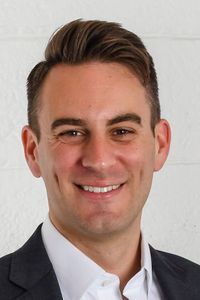Josh Owens (Indiana)
Josh Owens (Democratic Party) ran for election for Governor of Indiana. He did not appear on the ballot for the Democratic primary on June 2, 2020.
Owens was a candidate for an at-large seat on the Indianapolis School Board in Indiana. He lost the general election on November 4, 2014.
Biography
Owens grew up in Shelbyville, Indiana. As of 2019, he lived in Indianapolis, Indiana, with his husband, Andy. Owens earned a B.A. in economics from Wabash College in 2007 and his master's degree in economic history from the London School of Economics and Political Science in 2012. Owens became the CEO of SupplyKick, an online retailer, in 2016.[1][2]
Owes worked as a professor of economics and statistics at the Butler University Lacy School of Business from 2013 to 2018. During his tenure at Butler University, Owens received the Excellence in Teaching award.[1][2]
As of 2019, Owens served on the boards of Orr Fellowship, Indy Chamber, and TechPoint.[2]
Below is a brief timeline of Owens' professional experience:
- 2016-present: CEO, SupplyKick
- 2013-2018: Professor of economics and statistics, Butler University Lacy School of Business
- January-August 2013: Legislative advisor on economics for U.S. Rep. Luke Messer (R), Indiana's 6th Congressional District
- 2010-2011: Director of acquisitions and business development, One Click Internet Ventures
- 2007-2010: Analytics and marketing strategy manager, Angie's List[1]
Elections
2020
See also: Indiana gubernatorial election, 2020
Indiana gubernatorial election, 2020 (June 2 Republican primary)
Indiana gubernatorial election, 2020 (June 2 Democratic primary)
General election
General election for Governor of Indiana
Incumbent Eric Holcomb defeated Woody Myers and Donald Rainwater in the general election for Governor of Indiana on November 3, 2020.
Candidate | % | Votes | ||
| ✔ |  | Eric Holcomb (R) | 56.5 | 1,706,727 |
 | Woody Myers (D) | 32.1 | 968,094 | |
 | Donald Rainwater (L) | 11.4 | 345,567 | |
| Total votes: 3,020,388 | ||||
 = candidate completed the Ballotpedia Candidate Connection survey. = candidate completed the Ballotpedia Candidate Connection survey. | ||||
| If you are a candidate and would like to tell readers and voters more about why they should vote for you, complete the Ballotpedia Candidate Connection Survey. | ||||
Do you want a spreadsheet of this type of data? Contact our sales team. | ||||
Democratic primary election
Democratic primary for Governor of Indiana
Woody Myers advanced from the Democratic primary for Governor of Indiana on June 2, 2020.
Candidate | % | Votes | ||
| ✔ |  | Woody Myers | 100.0 | 408,230 |
| Total votes: 408,230 | ||||
 = candidate completed the Ballotpedia Candidate Connection survey. = candidate completed the Ballotpedia Candidate Connection survey. | ||||
| If you are a candidate and would like to tell readers and voters more about why they should vote for you, complete the Ballotpedia Candidate Connection Survey. | ||||
Do you want a spreadsheet of this type of data? Contact our sales team. | ||||
Withdrawn or disqualified candidates
- Eddie Melton (D)
- Josh Owens (D)
Republican primary election
Republican primary for Governor of Indiana
Incumbent Eric Holcomb advanced from the Republican primary for Governor of Indiana on June 2, 2020.
Candidate | % | Votes | ||
| ✔ |  | Eric Holcomb | 100.0 | 524,496 |
| Total votes: 524,496 | ||||
 = candidate completed the Ballotpedia Candidate Connection survey. = candidate completed the Ballotpedia Candidate Connection survey. | ||||
| If you are a candidate and would like to tell readers and voters more about why they should vote for you, complete the Ballotpedia Candidate Connection Survey. | ||||
Do you want a spreadsheet of this type of data? Contact our sales team. | ||||
Withdrawn or disqualified candidates
- Brian Roth (R)
Libertarian convention
Libertarian convention for Governor of Indiana
Donald Rainwater advanced from the Libertarian convention for Governor of Indiana on March 7, 2020.
Candidate | ||
| ✔ |  | Donald Rainwater (L) |
 = candidate completed the Ballotpedia Candidate Connection survey. = candidate completed the Ballotpedia Candidate Connection survey. | ||||
| If you are a candidate and would like to tell readers and voters more about why they should vote for you, complete the Ballotpedia Candidate Connection Survey. | ||||
Do you want a spreadsheet of this type of data? Contact our sales team. | ||||
Withdrawn or disqualified candidates
- Bill Levin (L)
2014
The election in Indianapolis featured three seats up for general election on November 4, 2014. At-large incumbent Andrea J. Roof ran against challengers Ramon Batts, David Hampton, Josh Owens and Mary Ann Sullivan. Kelly Bentley and James Turner competed with board member Samantha Adair-White for the District 3 seat, and District 5 incumbent Michael D. Brown faced a challenge from LaNier L. Echols. Challengers Mary Ann Sullivan, Kelly Bentley and LaNier L. Echols won the three seats.
Results
| Party | Candidate | Vote % | Votes | |
|---|---|---|---|---|
| Nonpartisan | 45.6% | 14,000 | ||
| Nonpartisan | Andrea J. Roof Incumbent | 19.9% | 6,115 | |
| Nonpartisan | David Hampton | 17.7% | 5,431 | |
| Nonpartisan | Ramon Batts | 9.4% | 2,879 | |
| Nonpartisan | Josh Owens | 7.5% | 2,295 | |
| Total Votes | 30,720 | |||
| Source: Marion County Election Board, "2014 General Election Results for Marion County," accessed December 29, 2014 | ||||
Funding
Owens reported $2,208.00 in contributions and $1,163.96 in expenditures during the election, which left him with $1,044.04 on hand according to the Marion County Election Board.[3]
Endorsements
Owens did not receive any official endorsements for his campaign during the election.
Campaign themes
2020
Ballotpedia survey responses
See also: Ballotpedia's Candidate Connection
Josh Owens did not complete Ballotpedia's 2020 Candidate Connection survey.
2014
Owens provided the following responses to a survey conducted by Chalkbeat:
| |||||||
See also
2020 Elections
External links
- Search Google News for this topic
- Indianapolis Public Schools
- Campaign website
- 2014 campaign Facebook page
- LinkedIn page
Footnotes
- ↑ 1.0 1.1 1.2 LinkedIn, "Joshua Owens," accessed September 17, 2019
- ↑ 2.0 2.1 2.2 Ballotpedia's Elections team, "Email communication with Claire Griffith," September 16, 2019
- ↑ Marion County Election Board, "Most Recent Campaign Finance Filings," accessed October 17, 2014
- ↑ Note: This text is quoted verbatim from the original source. Any inconsistencies are attributable to the original source.
- ↑ Chalkbeat, "Survey: Josh Owens calls for IPS to help students catch up with tutoring," October 6, 2014
 |
State of Indiana Indianapolis (capital) |
|---|---|
| Elections |
What's on my ballot? | Elections in 2026 | How to vote | How to run for office | Ballot measures |
| Government |
Who represents me? | U.S. President | U.S. Congress | Federal courts | State executives | State legislature | State and local courts | Counties | Cities | School districts | Public policy |







